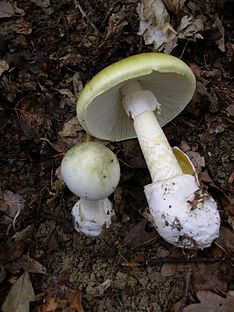Death cap
| Amanita phalloides | |
|---|---|
 |
|
| Scientific classification | |
| Kingdom: | Fungi |
| Phylum: | Basidiomycota |
| Class: | Agaricomycetes |
| Order: | Agaricales |
| Family: | Amanitaceae |
| Genus: | Amanita |
| Species: | A. phalloides |
| Binomial name | |
|
Amanita phalloides (Vaill. ex Fr.) Link (1833) |
|
| Amanita phalloides | |
|---|---|
| Mycological characteristics | |
| gills on hymenium | |
|
|
cap is convex or flat |
| hymenium is free | |
| stipe has a ring and volva | |
| spore print is white | |
| ecology is mycorrhizal | |
| edibility: deadly | |
Amanita phalloides /æməˈnaɪtə fəˈlɔɪdiːz/, commonly known as the death cap, is a deadly poisonous basidiomycete fungus, one of many in the genus Amanita. Widely distributed across Europe, A. phalloides forms ectomycorrhizas with various broadleaved trees. In some cases, the death cap has been introduced to new regions with the cultivation of non-native species of oak, chestnut, and pine. The large fruiting bodies (mushrooms) appear in summer and autumn; the caps are generally greenish in colour, with a white stipe and gills.
These toxic mushrooms resemble several edible species (most notably caesar's mushroom and the straw mushroom) commonly consumed by humans, increasing the risk of accidental poisoning. Amatoxins, the class of toxins found in these mushrooms, are thermostable: they resist changes due to heat and so, their toxic effects are not reduced by cooking.
...
Wikipedia
